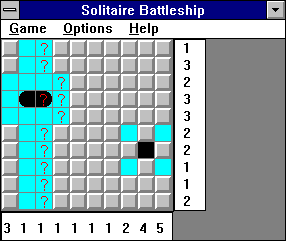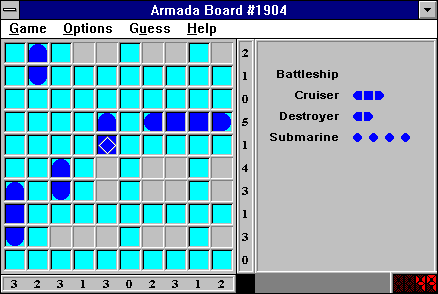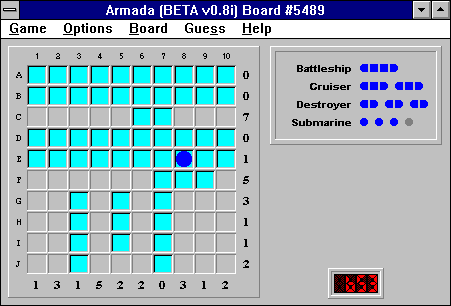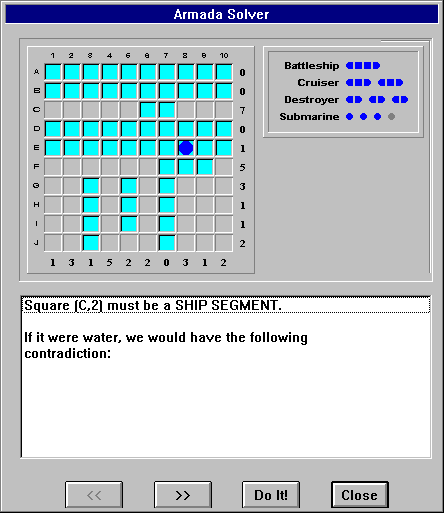|
|
History of Fathom It! |
|
|
History of Fathom It! |
The idea of Fathom It! was born in May 1993, when I bought the June '93 issue of GAMES Magazine. GAMES Magazine is one of the most creative, fascinating and original puzzle magazines I know of. One of the columns was called "Battleships", and presented six boards that looked like the classic game of Battleship I played as a kid. The difference was that these boards were a solitaire puzzle, and were meant to be solved using logical deduction.
I guess it was the subtle deductions needed to solve the boards that captured my imagination. After solving the first two boards, I was hooked.
However, I found one aspect of the pencil-and-paper solving method frustrating. This was the erasing necessary when a guess turned out wrong. I wanted to concentrate on the puzzle aspect of the game, and not worry about constantly writing and erasing on the boards.
As a professional programmer and a shareware "wanna-be", I started toying with the idea of writing a Windows program to reduce the tedium of solving the boards. In March 1994, I began implementing a prototype. Within a week I had the following up and running:

For lack of a better name I called it "Solitaire Battleship". It was primitive, and didn't handle wildcard ship segments, but it had rudimentary "smart toggle" and "smart fill" features. This gave me a feel for the game, and suggested improvements. Most importantly, it enabled me to hand it around to my colleagues at work, and receive feedback from them.
A year later, having changed the name to "Armada" and working odd-and-end hours on the program, here's what it looked like:

At this time, Armada handled wildcard ship segments, had better smart fill/toggle, sported a ship display window, kept score (the bottom-right corner), and generated boards on-the-fly. The user interface was pretty rough, and there was no concept of a board solver.
A major problem that surfaced at this time was that the dynamically generated boards sometimes had more than one solution. Since Armada was convinced its solution was the correct one, it would bomb out when a player finalized a logically valid, but different, square content. After investigating the theoretical implications (with thanks to Shmuel Siegel for his excellent insights), I realized that boards could not be simply generated on-the-fly. Rather, a database of boards would have to be generated off-line, each board carefully hinted to leave one, unique solution.
Version 0.8i was the first version I felt comfortable releasing to beta testers. The off-line MS-DOS board solver was packaged up and integrated into the Windows application. Requesting beta testers on CompuServe, I had the good fortune to find four beta testers who actually tested Armada and returned meaningful reports. I still felt, however, that Armada needed more work on the solver, and a better user interface before I could release it as true Shareware. You can see how similar it is to the final product, but is missing buttons, a "best moves" counter, keeping track of high scores. Not to mention that the solver had a habit of sometimes recommending correct, but non-intuitive, hints.
Here are snapshots of that version:


SolBat/Armada underwent another name change, this time being called "Fathom It!". I realized Armada wouldn't hack it when I began receiving e-mails from gamers who mistook the program for "Wing Commander: Armada".
Notwithstanding a full-time day programming job, Fathom It!'s user interface was spruced up. The major work went into perfecting the on-line board solver, generating tens of thousands of boards off-line, writing the help file, and the myriad small details that go into releasing a real product.